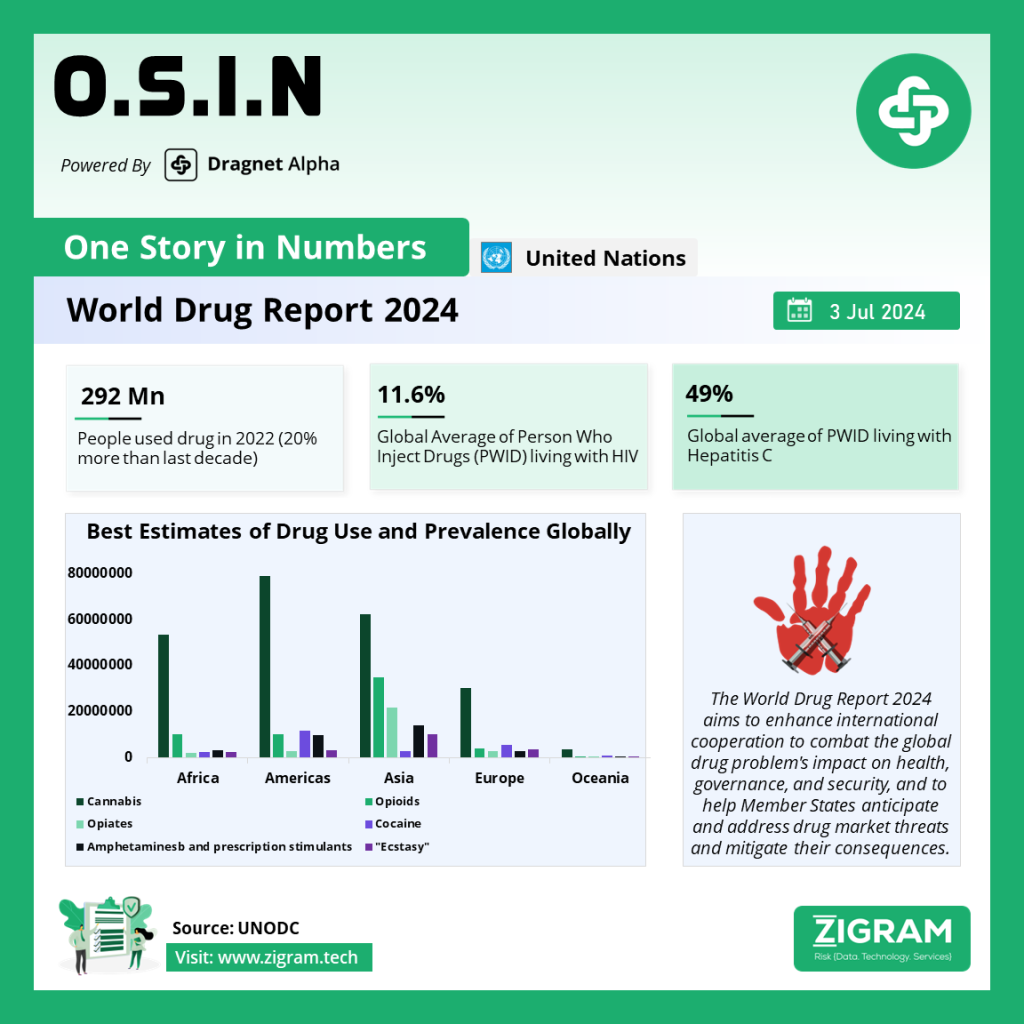Vienna, 26 June 2024
The UN Office on Drugs and Crime (UNODC) released its World Drug Report 2024, highlighting the intensifying global drug problem driven by new synthetic opioids and unprecedented levels of drug supply and demand. The report reveals a rise in drug use disorders and environmental harm, exacerbated by increased drug production, trafficking, and use.
Escalating Drug Problem
UNODC Executive Director Ghada Waly emphasized the growing threat posed by the drug problem: “Drug production, trafficking, and use continue to exacerbate instability and inequality, while causing untold harm to people’s health, safety, and well-being. We need to provide evidence-based treatment and support to all people affected by drug use, while targeting the illicit drug market and investing much more in prevention.”
Key Statistics:
– Total Drug Users: 292 million in 2022, a 20% increase over ten years.
– Cannabis: 228 million users, the most widely used drug globally.
– Opioids: 60 million users.
– Amphetamines: 30 million users.
– Cocaine: 23 million users.
– Ecstasy: 20 million users.
Rise of Synthetic Opioids
The report notes the emergence of nitazenes, a group of synthetic opioids more potent than fentanyl, in several high-income countries. This has led to a spike in overdose deaths.
Treatment Disparities
Despite 64 million people worldwide suffering from drug use disorders, only one in eleven receives treatment. Women have less access to treatment than men, with only one in eighteen women in treatment compared to one in seven men.
Legal and Criminal Justice Responses
In 2022, 7 million people had formal contact with police for drug offenses, mostly related to drug use or possession. Additionally, 2.7 million people were prosecuted, and over 1.6 million were convicted for drug offenses globally.
Special Focus Areas
The World Drug Report 2024 includes special chapters on various critical issues:
The Opium Ban in Afghanistan
Afghanistan’s drastic 95% decrease in opium production in 2023, alongside a 36% increase in Myanmar, led to a 74% global reduction in opium production. This shift has impoverished Afghan farmers and enriched traffickers, with long-term implications for heroin purity, alternative opioid use, and increased demand for opiate treatment services.
Synthetic Drugs and Gender
The report examines the gendered impacts of synthetic drug use and trafficking, highlighting disparities in treatment access and the unique vulnerabilities faced by women.
Cannabis Legalization and Its Consequences
As of January 2024, cannabis has been legalized for non-medical use in Canada, Uruguay, and 27 U.S. jurisdictions. This has accelerated harmful use and diversified high-THC products, leading to increased hospitalizations and psychiatric disorders, particularly among young adults.
Psychedelic “Renaissance”
Interest in the therapeutic use of psychedelics continues to grow, but the lack of scientific guidelines for medical use poses risks. The burgeoning commercial interest and movements advocating for broad access to psychedelics may compromise public health goals.
Drug Trafficking in the Golden Triangle
Drug traffickers in the Golden Triangle are expanding into wildlife trafficking, financial fraud, and illegal resource extraction, causing environmental degradation and socio-economic harm to displaced, poor, and migrant communities.
Environmental Impact
Drug-related activities are causing significant environmental damage, including deforestation, toxic waste dumping, and chemical contamination. This environmental degradation further compounds the social and economic harm inflicted on vulnerable communities.
Right to Health
The report reaffirms the right to health as an internationally recognized human right, applicable to all, including people who use drugs, their families, and communities. Ensuring access to health services without discrimination is essential for addressing the global drug problem.
The World Drug Report 2024 underscores the urgent need for comprehensive, evidence-based strategies to combat the escalating drug crisis. This includes enhancing treatment access, targeting illicit markets, and investing in prevention to mitigate the health, social, and environmental harms associated with drug use and trafficking.
Read the full report here.
- #UNODC
- #WorldDrugReport2024
- #DrugCrisis
- #SyntheticOpioids
- #DrugTrafficking
- #CannabisLegalization
- #Psychedelics
- #PublicHealth
- #EnvironmentalImpact
- #RightToHealth
- #DrugUseDisorders
- #GlobalHealth
- #Prevention
- #TreatmentAccess
- #OpiumBan
- #GoldenTriangle

